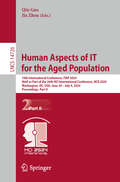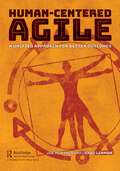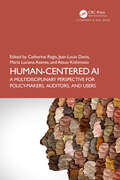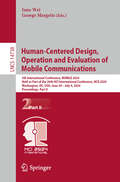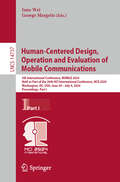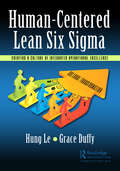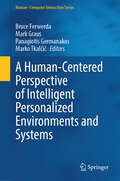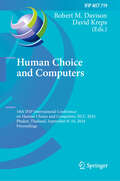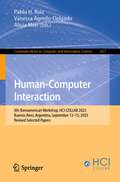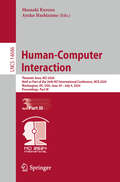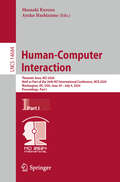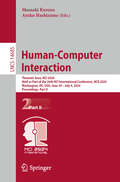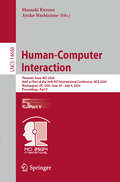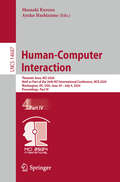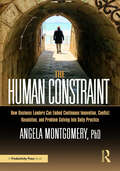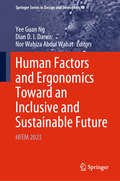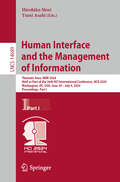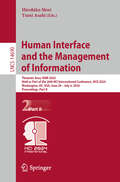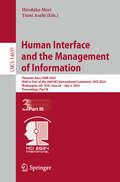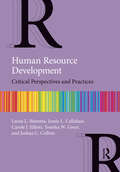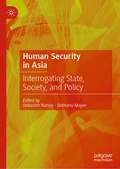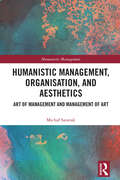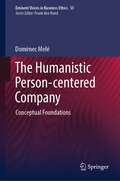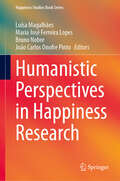- Table View
- List View
Human Aspects of IT for the Aged Population: 10th International Conference, ITAP 2024, Held as Part of the 26th HCI International Conference, HCII 2024, Washington, DC, USA, June 29–July 4, 2024, Proceedings, Part II (Lecture Notes in Computer Science #14726)
by Jia Zhou Qin GaoThis two-volume set LNCS 14725-14726 constitutes the thoroughly refereed proceedings of the 10th International Conference on Human Aspects of IT for the Aged Population (ITAP 2024), held as part of the 26th International Conference on Human-Computer Interaction, HCI International 2024 (HCII 2024), was held as a hybrid event in Washington DC, USA, during June/July 2024. The total of 1271 papers and 309 posters included in the HCII 2023 proceedings was carefully reviewed and selected from 5108 submissions. The ITAP 2024 conference offers a broad range of relevant disciplines and domains to exchange 1) research contributions on older people's abilities and competencies, needs and requirements, and attitudes and behavioral patterns in relation to IT use; 2) innovative ideas, practices, and experiences related to the design, operation, and evaluation of IT applications, systems, and services for older people.
Human Barrier Design and Lifecycle: A Cognitive Ergonomics Approach and Path Forward
by Tom ShephardA common source of failure in a human‑dependent barrier or safety critical task is a designed‑in mismatch error. The mismatch is a cognitive demand that exceeds the human capability to reliably and promptly respond to that demand given the plausible situations at that moment. Demand situations often include incomplete information, increased time pressures, and challenging environments. This book presents innovative solutions to reveal, prevent, and mitigate these and many other cognitive‑type errors in barriers and safety critical tasks. The comprehensive model and methodologies also provide insight into where and to what extent these barriers and task types may be significantly underspecified and the potential consequences.This title presents a new and comprehensive prototype design and lifecycle model specific to human‑dependent barriers and safety critical tasks. Designed to supplement current practice, the model is fully underpinned by cognitive ergonomics and cognitive science. The book also presents a compelling case for why a new global consensus standard specific to human‑dependent barriers is needed. Taking a novel approach, it presents its suggested basis, framing, and content. Both solutions seek to redress deficiencies in global regulations, standards, and practice. The model is guided by industry recommendations and best practice guidance and solutions from globally recognized experts. Its processes are fully explained and supported by examples, analysis, and well‑researched background materials. Real‑life case studies from offshore oil and gas, chemical manufacturing, transmission pipelines, and product storage provide further insight into how overt and latent design errors contributed to barrier degradation and failure and the consequence of those errors.An essential and fascinating read for professionals, Human Barrier Design and Lifecycle: A Cognitive Ergonomics Approach and Path Forward will appeal to those in the fields of human factors, process and technical safety, functional safety, display and safety system design, risk management, facility engineering, and facility operations and maintenance.Chapters 1 and 8 of this book are freely available as downloadable Open Access PDFs at http://www.taylorfrancis.com under a Creative Commons Attribution-Non Commercial-No Derivatives (CC-BYNC-ND) 4.0 International license.
Human-Centered Agile: A Unified Approach for Better Outcomes
by Joe Montalbano Brad LehmanThis book is a guide on how to apply Human-Centered Design (HCD) practices to an Agile product development model that is used widely throughout industry and government, where it is applied primarily to software and technology development efforts. This has been an ongoing industry challenge due to the fact that HCD prioritizes time spent understanding the problems to be solved (time spent in the problem space), while Agile prioritizes a fast hypothesize-and-deliver model (time spent in the solution space). Organizations that attempt an Agile transformation abandon it either because it was too difficult or because it did not deliver the hoped-for results. At the same time, efforts to improve the design and experience of their products using Human-Centered Design have a tendency to fall short because it can be difficult to see the ROI of design efforts, even while companies like McKinsey document design-driven successes. What’s more, a company that successfully adopts Agile often seems to have an even harder time implementing HCD and vice versa. This is particularly disappointing since Agile and HCD should be mutually supportive. In practice, Agile teams often bypass HCD efforts in favor of finishing their goals and thinking they are doing well, only to have their work product fail to meet the actual end user’s needs. At first the team will become indignant. “We followed the expert guidance of our Product Owner, the ‘Voice of the Customer,’” they will say, followed by “but… it met all of the Acceptance Criteria, they should love it.” It’s a failure of Agile that this type of sub-optimal delivery happens so regularly and predictably. The fact that team responses can be so accurately predicted in advance (by those who’ve seen this movie many times before) point to a process failure or inefficiency that is widespread and desperately needs to be addressed. Alternatively, teams will invest too heavily in up-front discovery efforts that slow down delivery to an unacceptable point, often while also failing to capture research-based findings in a way that matures the overall strategic product or portfolio understanding. The cost of misfiring goes far beyond a bad delivery or an angry customer. Decreased team morale drives poorer future performance (cost), turnover if left unchecked (more cost), and non-productive blame sessions that lead to degraded faith in the Agile product development model itself. This book identifies solutions based on successful methods of integrating HCD practices by phase into an ongoing agile delivery model, from the discovery through implementation and evaluation, including: key success factors for an HCD/Agile engagement approach, critical points of delivery, and strategies for integrating HCD into teams based on the existing design maturity of an organization or product team.
Human-Centered AI: A Multidisciplinary Perspective for Policy-Makers, Auditors, and Users (Chapman & Hall/CRC Artificial Intelligence and Robotics Series)
by Catherine Régis Jean-Louis Denis Maria Luciana Axente Atsuo KishimotoArtificial intelligence (AI) permeates our lives in a growing number of ways. Relying solely on traditional, technology-driven approaches won't suffice to develop and deploy that technology in a way that truly enhances human experience. A new concept is desperately needed to reach that goal. That concept is Human-Centered AI (HCAI).With 29 captivating chapters, this book delves deep into the realm of HCAI. In Section I, it demystifies HCAI, exploring cutting-edge trends and approaches in its study, including the moral landscape of Large Language Models. Section II looks at how HCAI is viewed in different institutions—like the justice system, health system, and higher education—and how it could affect them. It examines how crafting HCAI could lead to better work. Section III offers practical insights and successful strategies to transform HCAI from theory to reality, for example, studying how using regulatory sandboxes could ensure the development of age-appropriate AI for kids. Finally, decision-makers and practitioners provide invaluable perspectives throughout the book, showcasing the real-world significance of its articles beyond academia.Authored by experts from a variety of backgrounds, sectors, disciplines, and countries, this engaging book offers a fascinating exploration of Human-Centered AI. Whether you're new to the subject or not, a decision-maker, a practitioner or simply an AI user, this book will help you gain a better understanding of HCAI's impact on our societies, and of why and how AI should really be developed and deployed in a human-centered future.
Human-Centered Design, Operation and Evaluation of Mobile Communications: 5th International Conference, MOBILE 2024, Held as Part of the 26th HCI International Conference, HCII 2024, Washington, DC, USA, June 29–July 4, 2024, Proceedings, Part II (Lecture Notes in Computer Science #14738)
by June Wei George MargetisThis book constitutes the refereed proceedings of the 5th International Conference on Design, Operation and Evaluation of Mobile Communications, MOBILE 2024, held as part of the 26th International Conference, HCI International 2024, which was held in Washington, DC, USA, during June 29-July 4, 2024. The total of 1271 papers and 309 posters included in the HCII 2024 proceedings was carefully reviewed and selected from 5108 submissions. The MOBILE 2024 proceedings were organized in the following topical sections: Part I: Mobile health and wellbeing; mobile applications, serious games and advanced interfaces; Part II: Mobile commerce, marketing and retail; mobile security, privacy, and safety; mobile user experience and design.
Human-Centered Design, Operation and Evaluation of Mobile Communications: 5th International Conference, MOBILE 2024, Held as Part of the 26th HCI International Conference, HCII 2024, Washington, DC, USA, June 29–July 4, 2024, Proceedings, Part I (Lecture Notes in Computer Science #14737)
by June Wei George MargetisThis book constitutes the refereed proceedings of the 5th International Conference on Design, Operation and Evaluation of Mobile Communications, MOBILE 2024, held as part of the 26th International Conference, HCI International 2024, which was held in Washington, DC, USA, during June 29-July 4, 2024. The total of 1271 papers and 309 posters included in the HCII 2024 proceedings was carefully reviewed and selected from 5108 submissions. The MOBILE 2024 proceedings were organized in the following topical sections: Part I: Mobile health and wellbeing; mobile applications, serious games and advanced interfaces; Part II: Mobile commerce, marketing and retail; mobile security, privacy, and safety; mobile user experience and design.
Human-Centered Lean Six Sigma: Creating a Culture of Integrated Operational Excellence
by Hung Le Grace DuffyThis book focuses on the human side of organizational culture. The authors approach organizational culture from the perspective of alignment to mission, vision, and values. Using a Lean Six Sigma structure, the sequence of chapters begins with the organization and its structure, then drills through strategic, operational, and tactical levels of process and behavior which establish and grow the overall culture of the organization over time. The book begins with foundational principles of organization, through the necessity of aligning processes and systems to mission and vision, assessment, gap analysis for improvement, prioritization, and chapters on qualitative and quantitative approaches for reducing variation and improving systems and behavior. Through this book, readers will: Learn the foundation and core concepts of the organization Discover the "right" focus of shifting the culture of the organization Recognize the building blocks of organizational culture and how to integrate them into a successful, customer-focused system of interconnected processes Focus on people as drivers of technology, rather than the reverse Explore techniques to address the challenges and concerns of today’s training and deployment for organizational performance excellence Use the chapters as short discussions or training workshops for either internal education or public/private technical education.
A Human-Centered Perspective of Intelligent Personalized Environments and Systems (Human–Computer Interaction Series)
by Marko Tkalčič Panagiotis Germanakos Bruce Ferwerda Mark GrausThis book investigates the potential of combining the more quantitative - data-driven techniques with the more qualitative - theory-driven approaches towards the design of user-centred intelligent systems. It seeks to explore the potential of incorporating factors grounded in psychological theory into adaptive/intelligent routines, mechanisms, technologies and innovations. It highlights models, methods and tools that are emerging from their convergence along with challenges and lessons learned. Special emphasis is placed on promoting original insights and paradigms with respect to latest technologies, current research trends, and innovation directions, e.g., incorporating variables derived from psychological theory and individual differences in adaptive intelligent systems so as to increase explainability, fairness, and transparency, and decrease bias during interactions while the control remains with the user.
Human Choice and Computers: 16th IFIP International Conference on Human Choice and Computers, HCC 2024, Phuket, Thailand, September 8–10, 2024, Proceedings (IFIP Advances in Information and Communication Technology #719)
by David Kreps Robert M. DavisonThis book constitutes the refereed proceedings of the 16th IFIP International Conference on Human Choice and Computers, HCC 2024, held in Phuket, Thailand, during September 8–10, 2024. The 9 full papers presented in this book were carefully reviewed and selected from 17 submissions. Summaries of 2 keynote presentations are also included. This papers focus on Humans, Technological Innovations and Artificial Intelligence: Opportunities and Consequences.
Human-Computer Interaction: 9th Iberoamerican Workshop, HCI-COLLAB 2023, Buenos Aires, Argentina, September 13–15, 2023, Revised Selected Papers (Communications in Computer and Information Science #1877)
by Pablo H. Ruiz Vanessa Agredo-Delgado Alicia MonThis book constitutes the referred proceedings of the 9th Iberoamerican Workshop on Human-Computer Interaction, HCI-COLLAB 2023, held in Buenos Aires, Argentina, during September 13–15, 2023. The 23 full papers presented in this book were carefully reviewed and selected from 84 submissions. They cover a variety of topics related to HCI such as: Emotional Interfaces, Usability, Video Games and Gamification, Computational Thinking, Internet of Things (IoT), Software Engineering, ICT in Education, Augmented and Mixed Virtual Reality for Education, Emotional Interfaces, Adaptive Instructional Systems, Accessibility, Artificial Intelligence in HCI, Industry 4. 0 and HCI, Infotainment Systems, Intelligent Systems, Collaborative Work and Learning, Cognition, and Interaction, among others.
Human-Computer Interaction: Thematic Area, HCI 2024, Held as Part of the 26th HCI International Conference, HCII 2024, Washington, DC, USA, June 29 – July 4, 2024, Proceedings, Part III (Lecture Notes in Computer Science #14686)
by Masaaki Kurosu Ayako HashizumeThis five-volume set LNCS 14684-14688 constitutes the refereed proceedings of the Human Computer Interaction thematic area of the 26 International Conference on Human-Computer Interaction, HCII 2024, held in Washington, DC, USA, during June 29 – July 4, 2024. The total of 1271 papers and 309 posters included in the HCII 2024 proceedings was carefully reviewed and selected from 5108 submissions. The VAMR 2024 proceedings were organized in the following topical sections: Part I: HCI Theory and Design and Evaluation Methods and Tools; Emotions in HCI. Part II: Human-Robot Interaction; Child-Computer Interaction. Part III: HCI for Mental Health and Psychological Wellbeing; HCI in Healthcare. Part IV: HCI, Environment and Sustainability; Design and User Experience Evaluation Case Studies. Part V: Multimodality and Natural User Interfaces; HCI, AI, Creativity, Art and Culture.
Human-Computer Interaction: Thematic Area, HCI 2024, Held as Part of the 26th HCI International Conference, HCII 2024, Washington, DC, USA, June 29 – July 4, 2024, Proceedings, Part I (Lecture Notes in Computer Science #14684)
by Masaaki Kurosu Ayako HashizumeThis five-volume set LNCS 14684-14688 constitutes the refereed proceedings of the Human Computer Interaction thematic area of the 26 International Conference on Human-Computer Interaction, HCII 2024, held in Washington, DC, USA, during June 29 – July 4, 2024. The total of 1271 papers and 309 posters included in the HCII 2024 proceedings was carefully reviewed and selected from 5108 submissions. The VAMR 2024 proceedings were organized in the following topical sections: Part I: HCI Theory and Design and Evaluation Methods and Tools; Emotions in HCI. Part II: Human-Robot Interaction; Child-Computer Interaction. Part III: HCI for Mental Health and Psychological Wellbeing; HCI in Healthcare. Part IV: HCI, Environment and Sustainability; Design and User Experience Evaluation Case Studies. Part V: Multimodality and Natural User Interfaces; HCI, AI, Creativity, Art and Culture.
Human-Computer Interaction: Thematic Area, HCI 2024, Held as Part of the 26th HCI International Conference, HCII 2024, Washington, DC, USA, June 29 – July 4, 2024, Proceedings, Part II (Lecture Notes in Computer Science #14685)
by Masaaki Kurosu Ayako HashizumeThis five-volume set LNCS 14684-14688 constitutes the refereed proceedings of the Human Computer Interaction thematic area of the 26 International Conference on Human-Computer Interaction, HCII 2024, held in Washington, DC, USA, during June 29 – July 4, 2024. The total of 1271 papers and 309 posters included in the HCII 2024 proceedings was carefully reviewed and selected from 5108 submissions. The VAMR 2024 proceedings were organized in the following topical sections: Part I: HCI Theory and Design and Evaluation Methods and Tools; Emotions in HCI. Part II: Human-Robot Interaction; Child-Computer Interaction. Part III: HCI for Mental Health and Psychological Wellbeing; HCI in Healthcare. Part IV: HCI, Environment and Sustainability; Design and User Experience Evaluation Case Studies. Part V: Multimodality and Natural User Interfaces; HCI, AI, Creativity, Art and Culture.
Human-Computer Interaction: Thematic Area, HCI 2024, Held as Part of the 26th HCI International Conference, HCII 2024, Washington, DC, USA, June 29 – July 4, 2024, Proceedings, Part V (Lecture Notes in Computer Science #14688)
by Masaaki Kurosu Ayako HashizumeThis five-volume set LNCS 14684-14688 constitutes the refereed proceedings of the Human Computer Interaction thematic area of the 26 International Conference on Human-Computer Interaction, HCII 2024, held in Washington, DC, USA, during June 29 – July 4, 2024. The total of 1271 papers and 309 posters included in the HCII 2024 proceedings was carefully reviewed and selected from 5108 submissions. The VAMR 2024 proceedings were organized in the following topical sections: Part I: HCI Theory and Design and Evaluation Methods and Tools; Emotions in HCI. Part II: Human-Robot Interaction; Child-Computer Interaction. Part III: HCI for Mental Health and Psychological Wellbeing; HCI in Healthcare. Part IV: HCI, Environment and Sustainability; Design and User Experience Evaluation Case Studies. Part V: Multimodality and Natural User Interfaces; HCI, AI, Creativity, Art and Culture.
Human-Computer Interaction: Thematic Area, HCI 2024, Held as Part of the 26th HCI International Conference, HCII 2024, Washington, DC, USA, June 29 – July 4, 2024, Proceedings, Part IV (Lecture Notes in Computer Science #14687)
by Masaaki Kurosu Ayako HashizumeThis five-volume set LNCS 14684-14688 constitutes the refereed proceedings of the Human Computer Interaction thematic area of the 26 International Conference on Human-Computer Interaction, HCII 2024, held in Washington, DC, USA, during June 29 – July 4, 2024. The total of 1271 papers and 309 posters included in the HCII 2024 proceedings was carefully reviewed and selected from 5108 submissions. The VAMR 2024 proceedings were organized in the following topical sections: Part I: HCI Theory and Design and Evaluation Methods and Tools; Emotions in HCI. Part II: Human-Robot Interaction; Child-Computer Interaction. Part III: HCI for Mental Health and Psychological Wellbeing; HCI in Healthcare. Part IV: HCI, Environment and Sustainability; Design and User Experience Evaluation Case Studies. Part V: Multimodality and Natural User Interfaces; HCI, AI, Creativity, Art and Culture.
The Human Constraint: How Business Leaders Can Embed Continuous Innovation, Conflict Resolution, and Problem Solving Into Daily Practice
by Angela MontgomeryThe Human Constraint is a business novel with supplementary material for business leaders. It is inspired by dozens of implementations of the Decalogue methodology in Europe and North America since 1996. The Decalogue blends Deming’s philosophy with the Theory of Constraints in a cohesive, systemic approach to management. The novel explores an increasingly complex, interdependent and fast-changing world where companies must have a way to overcome obsolete mental models and embed continuous innovation in their operations with a coherent organizational model.The story in Part One unfolds during the financial crisis that follows 2008 and illustrates how this affects a group of executives engaged in a transformation process. It charts their attempts through the crisis to transform part of an industry dominated by a zero-sum game mentality using a very different approach: an ethical and value-based supply chain where all stakeholders benefit.Through the narrative in Part One, readers are exposed to a way to embed continuous innovation, conflict resolution, and problem-solving in action. In Part Two readers will find an introduction to a systemic method for management and the Thinking Processes from the Theory of Constraints.These Thinking Processes can help readers develop the skills to:■ Understand and analyze our current reality, as individuals and organizations.■ Surface assumptions that keep us trapped in less-than-desirable situations.■ Generate robust solutions/innovations.■ Identify unintended consequences of what may seem like an effective idea and avert them upstream.■ Resolve conflicts in a win-win way.The knowledge, method, and tools to overcome obsolete mental models and practices exist. This book aims to present the reader, through narrative and supplementary material, with elements of a new way and a new economics that are fit for purpose in our age of complexity.
Human Factors and Ergonomics Toward an Inclusive and Sustainable Future: HFEM 2023 (Springer Series in Design and Innovation #46)
by Yee Guan Ng Dian D. I. Daruis Nor Wahiza Abdul WahatThis book gathers the refereed proceedings of the 5th HFEM Biennial Conference on Human Factors and Ergonomics, organized by the Human Factors and Ergonomics Society Malaysia, held in Langkawi, Malaysia on August 13–18, 2023. Under the theme "Accelerating Human Factors and Ergonomics Toward an Inclusive and Sustainable Future", it highlights the latest theories and models, as well as cutting-edge technologies and applications on human factors and ergonomics. By combining findings from a range of disciplines including engineering, design, robotics, health care, management, computer science, human biology, and behavioral science, it offers an excellent source of innovative ideas to stimulate future discussions and developments aimed at applying knowledge and techniques to optimize system performance, while at the same time promoting the health, safety, and well-being of individuals. It includes papers from researchers and practitioners, scientists and physicians, institutional leaders, managers, and policy makers that contribute to constructing the human factors and ergonomics approach across a variety of methodologies, domains, and productive sectors.
Human Interface and the Management of Information: Thematic Area, HIMI 2024, Held as Part of the 26th HCI International Conference, HCII 2024, Washington, DC, USA, June 29–July 4, 2024, Proceedings, Part I (Lecture Notes in Computer Science #14689)
by Hirohiko Mori Yumi AsahiThis three-volume set LNCS 14789-14791 constitutes the thoroughly refereed proceedings of the thematic area Human Interface and the Management of Information, HIMI 2024, held as part of the 26th International Conference on Human-Computer Interaction, HCI International 2024 (HCII 2024), was held as a hybrid event in Washington DC, USA, during June/July 2024. The total of 1271 papers and 309 posters included in the HCII 2023 proceedings was carefully reviewed and selected from 5108 submissions. The HIMI conference addressed approaches and objectives of information and data design, retrieval, presentation and visualization, management, and evaluation in human computer interaction in a variety of application domains, such as, for example, learning, work, decision, collaboration, medical support, and service engineering, and much more.
Human Interface and the Management of Information: Thematic Area, HIMI 2024, Held as Part of the 26th HCI International Conference, HCII 2024, Washington, DC, USA, June 29–July 4, 2024, Proceedings, Part II (Lecture Notes in Computer Science #14690)
by Hirohiko Mori Yumi AsahiThis three-volume set LNCS 14789-14791 constitutes the thoroughly refereed proceedings of the thematic area Human Interface and the Management of Information, HIMI 2024, held as part of the 26th International Conference on Human-Computer Interaction, HCI International 2024 (HCII 2024), was held as a hybrid event in Washington DC, USA, during June/July 2024. The total of 1271 papers and 309 posters included in the HCII 2023 proceedings was carefully reviewed and selected from 5108 submissions. The HIMI conference addressed approaches and objectives of information and data design, retrieval, presentation and visualization, management, and evaluation in human computer interaction in a variety of application domains, such as, for example, learning, work, decision, collaboration, medical support, and service engineering, and much more.
Human Interface and the Management of Information: Thematic Area, HIMI 2024, Held as Part of the 26th HCI International Conference, HCII 2024, Washington, DC, USA, June 29–July 4, 2024, Proceedings, Part III (Lecture Notes in Computer Science #14691)
by Hirohiko Mori Yumi AsahiThis three-volume set LNCS 14789-14791 constitutes the thoroughly refereed proceedings of the thematic area Human Interface and the Management of Information, HIMI 2024, held as part of the 26th International Conference on Human-Computer Interaction, HCI International 2024 (HCII 2024), was held as a hybrid event in Washington DC, USA, during June/July 2024. The total of 1271 papers and 309 posters included in the HCII 2023 proceedings was carefully reviewed and selected from 5108 submissions. The HIMI conference addressed approaches and objectives of information and data design, retrieval, presentation and visualization, management, and evaluation in human computer interaction in a variety of application domains, such as, for example, learning, work, decision, collaboration, medical support, and service engineering, and much more.
Human Resource Development: Critical Perspectives and Practices
by Laura L. Bierema Jamie L. Callahan Carole J. Elliott Tomika W. Greer Joshua C. CollinsHuman Resource Development: Critical Perspectives and Practices is a landmark textbook on HRD scholarship and practice and is a significant departure from the standard HRD texts available. Based on Bierema and Callahan’s framework for critical human resource development, this book develops an understanding of HRD that addresses both key and contested issues of practice associated with relating, learning, changing, and organizing for organizations. This book covers the basic tenets of HRD, interrogates the dominant paradigms and practices of the field, teaches readers how to critically assess HRD practices and outcomes, and provides critical alternatives. The text also addresses HRD as a contested field and the importance for HRD professionals to reflect on their values, maintain their sanity, and retain their employment while attempting to do this difficult work that serves multiple stakeholders. The text weaves in Points to Ponder, Case in Point, and Tips & Tools features and exercises, giving readers an insight into HRD issues across the globe. This critical text offers an exciting alternative to the instrumentalist, managerialist, and masculine perspective of other books. Designed for students and practitioners, this textbook will be essential reading for upper-level courses on human resource development, human resource management, and adult education.
Human Security in Asia: Interrogating State, Society, and Policy
by Debasish Nandy Debtanu MajeeThis book discusses Human Security from a theoretical perspective. It builds theories in order to understand a phenomenon in a structured and well-ordered way. It sheds light on the conditions of the economy, food, health, community, environmental and political security in Asian states. It explores the idea of human security to understand the issues jeopardizing an individual’s security in the Asian continent and suggests policies to overcome these problems. This book argues that the nature of the government and the constitution are equally essential in ensuring the human security of a country. Some countries in Asia are not only economically vulnerable but also politically disrupted. The issues of hunger, poverty, illiteracy, militancy, terrorism, and ethnoreligious conflicts have posed threats to human security. The pandemic COVID-19 has brought a great humanitarian crisis. The role of the Asian states in combatting COVID-19 and protecting public health is highlighted in this book. With a multidimensional outlook this edited volume attempts to delineate an interdisciplinary discourse of human security in an Asian context.
Humanistic Management, Organization and Aesthetics: Art of Management and Management of Art (Humanistic Management)
by Michał SzostakThe book is the first worldwide publication of a complex theory of management aesthetics in humanistic management based on the aesthetics and arts approach allowing for a complete and systemic understanding of the management art and art management phenomena. The methodology is based on the critical literature review and empirical research applying qualitative, quantitative, and autoethnographic approaches The main goal of this monograph is to create a holistic model that organises the issues of management aesthetics and shows the interdependence of the components of this model. The role of this model should be to perform a central function for a complete and systemic understanding of the phenomenon of management aesthetics, as well as to perform the function of a field based on which analysis of individual issues in the area of management aesthetics is conducted. The critical component of this holistic model is Maria Gołaszewska’s theory of the aesthetic situation. Two theses of the book are the following: (1) the theory of aesthetics and artistic practice have the potential to enrich the theory and practice of management with qualitative components through deep immersion in the world of values and (2) management theory and practice have the potential to enrich the theory of aesthetics and artistic practice with efficiency components.
The Humanistic Person-centered Company (Issues in Business Ethics #55)
by Domènec MeléHumanism in business is not only an alternative to economism but a way to human excellence. Humanism presented here revolves around the rich notion of “human person”, keystone of modern personalist philosophy and Catholic Social Teaching. From this perspective this book is offered to everyone, believer and nonbeliever alike. The person-centered humanism considers the human-wholeness, individual and relational, with subjectivity, self-determination, openness to transcendence, and with capacity not only to possess but also to give. It also highlights the uniqueness of each person, endowed with a high constitutive dignity and in continuous process of flourishing toward human plenitude. An attitude of respect and good will is due to non-personal beings, while persons deserve to be treated with justice and even with love of benevolence. The book is prepared in dialogue with mainstream of thought in business and business ethics and focused on exploring ways to improve some conventional views. It includes some proposals such as a person-based ethics, ethics understood as intrinsic to business activity, the consideration of the company as an organized community of persons, and the purpose of the company oriented toward the common good through a double mission, internal and external. It is also suggested substituting the notion of “stakeholder” for the richer one of “relationholder.”
Humanistic Perspectives in Happiness Research (Happiness Studies Book Series)
by Luísa Magalhães Maria José Ferreira Lopes Bruno Nobre João Carlos Onofre PintoThis volume provides innovative perspectives on the scholarly connection between the humanities and happiness, and considers the narrative expressions of happiness and recent investigations about happiness, its metrics, and objective insights about human wellbeing. This volume relates intemporal humanistic values to views across social and behavioural sciences, and thereby covers a broad interdisciplinary frame, from philosophy, psychology, literary studies, to the communication sciences. The philosophers in this volume discuss the achievement of happiness through the cultivation of virtue, as well as the logic of the gift as an experience of personal fulfilment and the fact that happiness is inextricably linked to hope. Their chapters take on the approach of the permanent human struggle to generate global horizons of happiness and thus attain eternal bliss. Scholars from other fields of the humanities and communication sciences consider the positive messages of environmental happiness in virtual platforms, where the Homo digitalis finds happiness at the click of a button, often under the endorsement of celebrities, or under the visual fruition of playful objects. They also present the intertextual memory of happiness as a condition for humanistic research. Finally, this volume considers the sphere of education as the best place in which to apply the results of sustainable happiness measurement and research, and to realize this complementary, humanistic perspective on happiness research.
